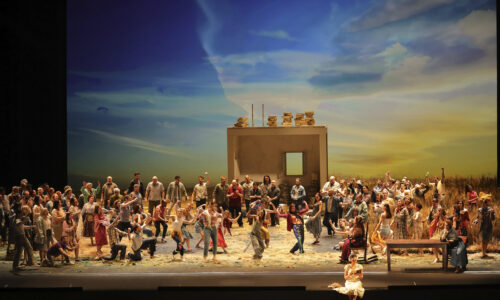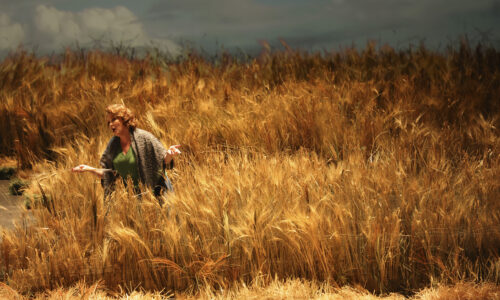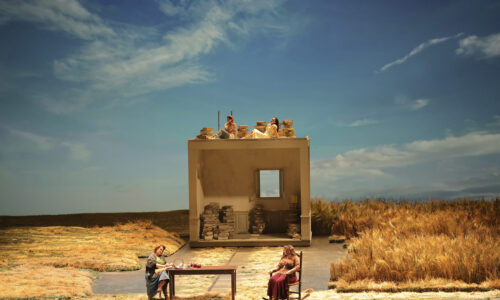The Fragility of Hope
La Scala’s unpoetic Eugene Onegin
Milano, Premiere, 14.03.2025
“Habit is a gift of God,
a substitute for joy.”
[Tchaikovsky, from Pushkin, Book two]
Lyricism and Ambiance
As an observer of the legendary love story of Tatyana and Eugene Onegin, the presence of the expanse of the Russian territory plays a large part in the way it seeps into the daily lives of its people, shaping their destinies. Moscow remains the citadel for opportunity, culture, and social festivity. Alexander Pushkin, and especially Anton Chekhov, deal with this as the background for their novels and stories, wherein their characters often form a tragi-comic view of life, their ambitions thwarted through disappointments and failed ideals. The contrasts of youth and ageing, hopes and regrets are always set between city and country life, which becomes at times their obsessive discourse as they sense the pressures of passing Time. Love and marriage remain their provincial ambition, yet dreamers and poets are estranged from this milieu as their existence will become a struggle, and they will fail in their attempts to find happiness once removed from their worlds of interior isolation Literature and poetic interpretations of life itself suspend them as they face the realities of interacting with others, and should they attempt to reach out to embrace love, the results can be disastrous.
The composer reveals much when he refers to his libretto as being those ‘lyrical scenes,’ creating literary images in our minds. Thus, within a free-flowing, almost stream-of-consciousness structure, it is those many ‘confessions’ that arrive on stage to hold our attention. Tchaikovsky’s perceptive libretto and music make the most of those moments in which the characters open themselves up to us from the depths of their shadowed existence, where even hope itself appears all too fragile. Yet, how often does it seem that they are talking to themselves instead? This can only move us into impassability as they reflect upon life as a force to grapple with, yet to knowingly succumb to. The ambiance in which they breathe may thus be distant from those scenic elements of Nature surrounding them. In this, all must encompass the composer’s musical language as illuminated beneath often cold, penetrating spotlights. Of the possible choices, it appears that Mario Martone in his La Scala production remains on the surface, causing his team to depict what is somewhat unpoetic and unconvincing.
A Square Room Hosts Delicate Souls
The great scenographer Margherita Palli, creator of many of Luca Ronconi’s historic operatic and theatrical representations again collaborates with the stage director Martone, yet they here have yielded uneven fruits. One may believe that, quite simply, the choice of setting (a would-be aura) must produce images that embrace the source of the dramatic predicament. Here instead, all remains a cross between the ‘déjà vu’ and the inability to move us subtly towards a deeper understanding of where life’s sentiments lie. Much is projected here in an attempt to touch upon Man’s relation to Nature, in all its beauty and cruelty. We have those flat, freshly harvested wheat fields of August outside St. Petersburg to one side, with those last melting sheets of ice covering the ground on the other. Then, there is a grey cement block cube, serving as Tatyana’s room; the fourth wall is open, and inside we see piles of huge books, creating a truly claustrophobic living space, somewhat more like a cellar. An un-shuttered window dominates the back wall, while a ladder takes us to a roof crowded with stacks of books. The ever-present room will slide forwards, then back again through the various scenes. It will later catch fire, and collapse as if shuddered by an earthquake, or perhaps even bombed, just when Tatyana learns of the scheduled duel between Lensky and Onegin. While being ineffective as the cataclysmic event it purports to be, one wonders how necessary and effective this gratuitous manifestation of destruction was, and how it could ever truly represent Tatyana’s inner world crumbling. We may stir when others enter that recessed sanctuary to communicate with her or moved in observing the uncanny room unoccupied or emptied. At other times, her books were piled up in the town square, recalling an auto-da-fé or even Fahrenheit 451. The third and last Act brings us to a grand Ball in commencement within a Dignitary’s house. We are there with Onegin, now excluded from society by a huge flimsy curtain capturing the shadows of dancers in a furious waltz. A short while after, that curtain rises, and we are on the dance floor of a disco, immersed in a society seeking amusement at a sort of ghastly Halloween party. Then, yes, in Act two, there was a masked goblin puppet pulled from a trunk to frighten the crowd seated in the bleachers.

Man’s relation to Nature
The other important scenic element integrated into this opera is Man’s relation to Nature, and so it was that the distant back wall of the stage became a screen. Upon this were clouds passing by almost imperceptible; never those puffy ones in which children see animals and objects, but here rather almost wind-blown streaks – blackened, reddened, or simply innocently white as if to reflect a characters’ swirling emotions. Though delicate in its subjectivity (Alessandro Papa, video), one thought more could have been done with this idea, what with the music capturing the states of agitation through a cloud’s animistic behavior. There, too, was a full daytime moon, or a night sky full of a million stars, yet all not resounding with beauty or awe.
A Potpourri of Epochs
There was some perplexity regarding the costumes (Ursula Patzak), carried out in great detail, yet presenting a motley array of characters within a potpourri of epochs; surely the stage director’s attempt to connect the mid-nineteenth century with today. Tatyana became an ‘Alice in Wonderland’, wearing portable stereo headphones at the beginning, only to pass on to a mountain vacationer in jeans with a white furry vest, then to an Audrey Hepburn at Tiffany’s for the final scene. The men, Lensky and Onegin, were true to heart, long-coats, suggesting the 1800’s, yet at other times in all-too-casual designer jackets donned for a week-end outing. Worse, however, was the chorus as clad: ranging from field workers in Levi’s and tee shirts, loose skirts and tank-tops, then grungy, ‘militaresque’ Eastern Europe bunches in wintertime. Their somewhat 1950’s disco evening dress ranged from Twiggy-posh to a Woody Allen party. Her husband Prince Gremin was a befitting heroic soldier in a double-breasted military outfit. One does not have to be a partisan for classical dress in order to object to these ineffective temporal transgressions. Again, nimble work from the costumer’s hands as designed and printed in the program, yet of weakened impact once upon the stage.
‘Letter Scene’ not at all well-staged
Lastly, other unsettling decisions by the stage director Martone: the idea of changing the pistol duel to a game of Russian roulette. Though some found that this diluted the sense of anticipation of a classic win-or-die challenge, others believed that Onegin would have felt more guilty had he pulled the trigger that fell a friend. True, duels in those times were carried out to perfection and in accordance with strict rules. Here, the pistol was put onto the table, slid back and forth in agitation until Lensky’s time ran out and Fate took its course. This change, carried out in this manner, was neither well-timed nor as devastatingly moving as it should be. Tatyana’s ‘Letter Scene’ was not at all well-staged. There was no table in her book-cluttered room, which is plausible. But when she changed position a dozen times, as if by need, to either follow the music or to stir up more emotion in us, all became a bit tedious. She sat on a stack of books, then stood, then sat upon the floor’s edge, then wandered about the stage, only to return to her base, her room, to sit, to stand, or to hold the paper to the wall while writing. May one instead have envisioned her while writing the love letter only in her mind? Or would the script appear in the distant sky? Anything but this, where she was sadly forced into an almost mechanical game of musical chairs.

The final scene was a letdown. The few remaining pieces of furniture on stage were carried off by stagehands, leaving Tatyana and Onegin isolated on a bare stage. They wandered about in an all-too-calculated manner, facing each other often at a distance, then entering into the upstage dark, and back into the light. Their illusions now shattered within that empty space, they could only be separated, as if in a nightmare.
As to the musical part, one may say that Maestro Timur Zangiev truly interpreted the score in a harmonic, sensitive and emotionally charged manner. The important arias were sustained gracefully, and thus the tempi breathed along with the characters’ needs to express themselves, almost as if all were happening there and then. The greatness of a Maestro comes out through the choice of tempi, dynamics, and rhythm, and in Tchaikovsky there is always room for interpretation, what with those sweeping melodies, preludes, tableaux. The balance of ff and pp sonorities were all well underlined, and most poignant. Lastly, one may have noted that Tatyana’s theme that opens the opera, and is repeated and reworked many times, always abstract from her stage presence, was treated intuitively; Maestro Zangiev infused sentiment in a slightly different way each time. The La Scala Orchestra and Chorus exemplified constancy throughout the performance, and the various performances seen. This chorus, as we know, excels, and has always done wonderfully in Russian operas, representing a population raising their voices in unison, raising our spirits.
Poet Singers
The singers were almost all Russians, offering us more than their excellent voices. The nuances and essences of their language brought out the beauties of Tchaikovsky’s music. Aida Garifullina as Olga could have been a perfect Tatyana, a reclusive, lanky 13-year-old not only immersed in her books, but displaying a certain ambiguity when engaging with her family. As to her voice, which one was able to hear on various nights, there was a certain fragility, glass-like that did not vibrate with emotion, or so it was noted. I did not find this in any way as a sign of insufficiency; her elegance and stage presence remined one of Callas in stature. This was a wonderful asset for this role. Her ‘Letter Scene’ was emotive and well-paced as to the singing, marred by the staging as mentioned. The costumes she wore also left little room for interpretation. To note, her character uniquely changes throughout the work, and she must play many roles: young girl, one in love, then a devastated woman, a wife denying her emotions to remain faithful. Somewhat like a Puccini heroine, Butterfly in particular.
Lensky intriguing poet
The two friends, Alexsey Markov as Onegin and Dmitrij Korčak as Lensky were excellently cast, especially so as we came to understand how little they understood each other through their acting, and how easily it was to fall into a duel. Onegin’s aria is not the show piece that Lensky’s is, thus it might appear that his interpretation is a bit superficial. Instead, one found him convincing when close to Tatyana, both in the First and Last Acts. He also showed a more sympathetic veneer towards others. The director here did well not to recreate that spoiled brat, insensitive ‘Don Giovanni’ figure. The range of the voice was difficult to detect as it appeared that his vocal interpretation was one that stressed acting; yet, as the evening went on, his vocal mettle grew, and his last scene was convincing. Lensky was intriguing as a poet, and one might have imagined him as the perfect match for Tatyana while Onegin danced the night away with the superficial Olga. His aria was magnificently portrayed and deeply moving. True, the emotions of love and death run the gamut, and the sincerity of the man crept into his voice, breaking ever so often under the stresses of an un-poetic reality.

Touches of Nobility of Spirit
Dmitrij Ulyanov’s Prince Gremin gave his wonderful aria those touches of nobility of spirit and sensibility regarding his society. We know little about him as he appears out of the blue, only to share his deep feelings with such sincerity that we must feel deeply for him. The range of emotions is musically extensive, especially fitting as he describes the stupidity of humanity. There comes a great moment when he tells us of the ways Tatyana saved him; she, the one who lived as a stranger to the vanities of the world he so despised. The voice is that of a true Russian bass. Silky, rich, smooth, never groveling in the depths of the register.
The rest of the cast were all convincing. Tatyana’s older sister Olga (Elmina Hasan, contralto) was the one character who seems to have profited most from Martone’s direction. The attraction is based upon her superficiality, as seen by her relation to her sister. She tells Tatyana that she remains ‘cheerful’ when listening to the songs of others, and we understand that this is not a sign of insensitivity, nor a refusal of life. Indeed, she will never run away into a dream world. The singing of her at-times ‘soubrette’ aria was touching, with the ringing, light-hearted tones in place. She acted well in the Act two garden party, revealing insensitivity towards her poet husband by dancing the night away with Onegin.
Minor characters were well chosen yet given little to do within the overall frame of the action. Though sung well and with moving tenderness, the nanny Filippyevna, Julia Gertseva, remained one-dimensional. Her mental lapses and confusion were sadly ignored by Tatyana in the opera and avoided here in this production. Yaroslav Abaimov as Triquet was elegant, sang well, and intriguing in his ability to capture the attention of the festivity-goers. He showed tenderness and vocal warmth is dealing with Tatyana. The aria is a showpiece, and here it proves so. In essence, it is like the tenor aria from Act one of Der Rosenkavalier. Oleg Budaratskiy as Zaretzky, the official regulator of the duel stood firm, and gave an imposing tonal touch to his singing. Huan Hong Li, the captain of the guard and Andrzej Glowienka, the peasant, completed the cast.
It has been said that we all search for love in another so as to find ourselves through them. The characters in Tchaikovsky’s opera come to us with perhaps those very same prerequisites. One may ask themselves how much we identify ourselves with any of those characters. This is the challenge all theater presents us with. At times, our experience can be rewarding, or, as with Tatyana and Onegin, bitterly sad and frustrating, as they both admit to each other in their parting: “Happiness was so near, So close, so close!”
